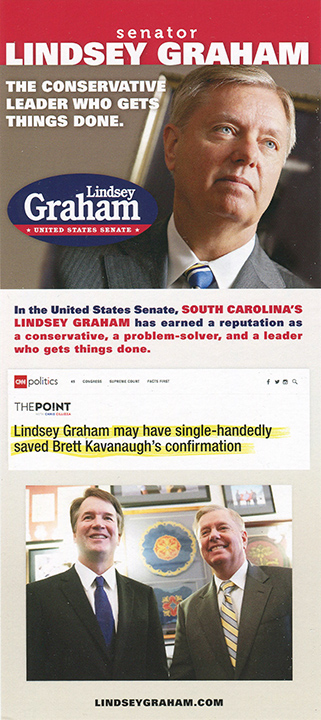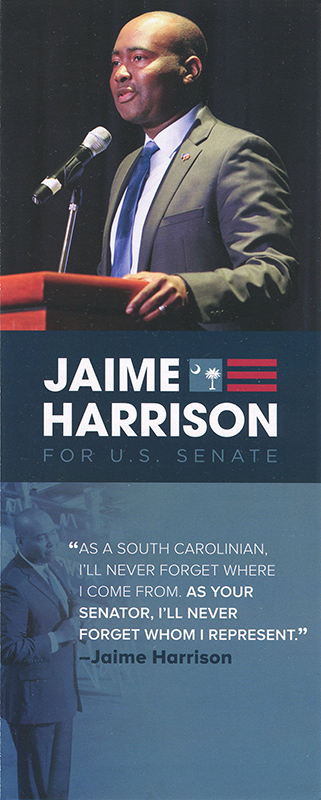- Main
Page « 2020
Senate Races «
South
Carolina Senate
| SOUTH
CAROLINA |
Nov. 3,
2020 U.S.
Senate
|
|
Plurality: 258,309 votes (10.27 percentage points). SC Election Commission
Notes: After the fourth most expensive U.S. Senate race ever, with total spending of $278.3 million, Sen. Lindsey Graham (R) won re-election, defeating associate DNC associate chair and attorney Jaime Harrison by a bit more than 10 percentage points. Graham, 65, first elected to the Senate in 2002, was seeking a fourth term. He elected to Congress in 1994 after serving a term in the SC State House. In 1998 he served as an impeachment manager in the trial against President Clinton. Graham also unsuccessfully sought the 2016 Republican presidential nomination, ending his bid on Dec. 21, 2015 (>). Harrison, 44, ran for chairman of the DNC in Feb. 2017, and took the position of associate chair when Tom Perez was elected. Previously he chaired the South Carolina Democratic Party from 2013-17 and worked as a lobbyist for the Podesta Group. Earlier he served as director of floor operations for House Majority Whip Jim Clyburn. Graham was a top target for Democrats. He had emerged as a strong—critics said sycophantic— supporter of President Trump. However, back in 2015 and early 2016, when had sought the Republican presidential nomination, Graham was sharply critical of Trump, leading to charges of hypocrisy (1, 2). Further aggravating Democrats, as chairman of the Senate Judiciary Committee, Graham played a key role in confirmation of Trump's many judicial appointments, including his emotional outburst during the Kavanaugh hearing in Sept. 2018 (>). For a Democrat to win in the red state of South Carolina was a long shot. At the top of the ticket, Trump was seen as all but certain to win. Still Harrison was an attractive candidate with a compelling story and his prolific fundraising made Graham sweat, evidenced by instances of Graham "begging" for money during appearing on Fox News. Graham discouraged primary challengers, announcing an impressive leadership team in July 2019. He comfortably won the June 9, 2020 primary, garnering 67.69% of the vote in defeating three candidates, led by Michael LaPierre (17.04%). On Oct. 1 Constitution Party candidate Bill Bledsoe said he was supporting Graham, but his name remained on the ballot. Later in October, the Harrison campaign and Democrats did some messaging pointing out that Bledsoe was still an option on the ballot, hoping to peel off some conservative support that might otherwise go to Graham. Following the death of Justice Ruth Bader Ginsburg on Sept. 18, the confirmation process of Trump's nominee Amy Coney Barrett put the spotlight on Graham. The Senate Judiciary Committee held confirmation hearings on Oct. 12-13 and the full Senate voted to confirm her on Oct. 27. An Oct. 22 fundraising email from Harrison campaign manager Zack Carroll stated, "Our path to victory is simple: We have to turn out every single voter in South Carolina who wants change." The email outlined details of the effort: "We started our radio, digital, and television advertising campaign in March, months before Lindsey Graham. We invested early this spring in grassroots organizing to communities of color, earlier than any South Carolina campaign in history." More specifically the memo highlighted campaign investments including:
- We spent $4.3
million on grassroots
mobilization, primarily
investing in communities of
color. For the first time in
modern history, we have a
grassroots presence in every
single one of South Carolina’s
46 counties.
In a post-election tweet, Graham campaign manager Scott Farmer summarized, "@harrisonjaime spent $132M and lost because his liberal ideas are out of touch with SC. Oh, and they tried to mislead voters into supporting a 3rd party candidate who had endorsed @LindseyGrahamSC. Voters saw through their shenanigans." Some national Democrats, looking back, questioned the wisdom of investing such a large amount in a race that many saw as essentially unwinnable. According to the Center for Responsive Politics, the bulk of the $278.3 million in spending was done by the campaigns themselves. The Harrison campaign spent $130.2 million while the Graham campaign spent $96.9 million and finished with cash on hand of $12.5 million. In terms of spending by outside groups $30.5 million was spent on the Democratic side and $20.7 million on the Republican side. The Senate Leadership Fund ($16.3 million) and Security is Strength super PAC ($13.7 million) accounted for most of the spending on the GOP side; on the Democratic side, Senate Majority PAC ($5.0 million) and The Lincoln Project ($2.5 million) were the top spenders (>). Campaign Managers: Lindsey Graham Scott Farmer Longtime Graham advisor. Owner of Farmer Strategies, LLC since Jan. 2009 and founder and partner of Lovell Investments LLC from Nov. 2008. Senior advisor on Lindsey Graham 2016 presidential campaign, Jan-Dec. 2015. Campaign manager at Team Graham, Inc., Sen. Graham's re-elect, Jan. 2013-Dec. 2014. Campaign manager on Lindsey Graham for Senate, Jan. 2007-Dec. 2008. Finance director on Lindsey Graham's campaign, Jan. 2001-Dec. 2006. Finance director at the South Carolina Republican Party, 1998-2000. Campaign coordinator on Mike Fair for Congress, 1997-98. Polling division of the Dole-Kemp '96 campaign. Bachelor's degree from Vanderbilt University. Jaime Harrison Zack Carroll (Apr. 2019) Campaign manager on Andy Kim for Congress (NJ), Aug. 2017-Dec. 2018. Campaign manager on Steven Jansen for Delegate (VA), Jan.-June 2017. Finance director on Bryan Caforio for Congress (CA), Dec. 2015-Nov. 2016. Finance director on John Bell for Delegate (VA), May-Nov. 2015. Deputy finance director on Mowrer for Iowa, June-Nov. 2014. Executive director of the DC Federation of College Democrats, May 2012-Feb. 2014. Staff assistant to U.S. Rep. Tammy Duckworth (IL), Jan.-May 2013; also worked as an assistant on Duckworth's campaign, Apr.-Nov. 2012 and summer 2013. Field organizer for the Democratic Party of DuPage County, June-Nov. 2010. B.A. in international studies from American University, 2015. See also: Michela Tindera. "Here Are The Billionaires Spending Big To Keep Lindsey Graham In The Senate." Forbes, Nov. 2, 2020. Catie Edmondson. "Graham's Star Turn as Confirmation M.C. Is Marred by Missteps." New York Times, Oct. 15, 2020. Jamie Lovegrove. "Lindsey Graham ramps up 2020 reelection bid with large SC leadership team." The Post and Courier, July 25, 2019. |



